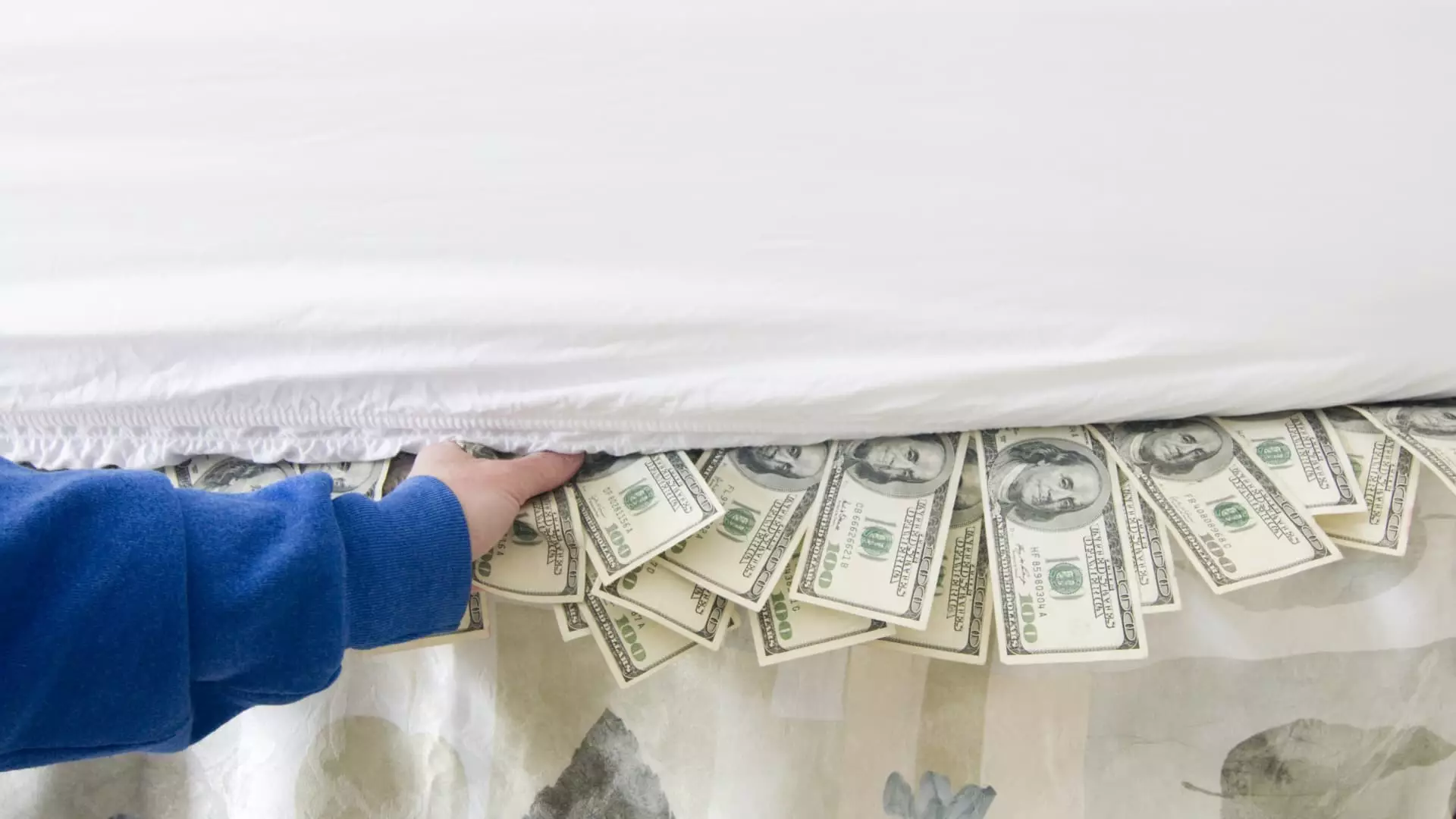In an era dominated by digital transactions and cashless payment systems, many individuals still cling to the comfort of keeping physical cash. A recent study conducted by the financial management platform Piere uncovered an unsettling truth: the average American household harbors approximately $544 in cash and valuables tucked away in various nooks and crannies. Alarmingly, about 10% of respondents admitted to housing their money in a safe, a practice that may reveal both prudence and naivety. While the allure of having cash on hand can feel empowering, it often betrays an underlying vulnerability—an inclination to safeguard what, in reality, may expose us to significant risks.
The Hidden Dangers of Cash Storing
A glance at unconventional cash storage habits reveals just how many people resort to risky hiding spots. Surprising percentages—6% stash money in secret compartments, while another 5% opt for the frosty depths of their freezers—should serve as a wake-up call. The concept of hiding cash may seem clever at first, but the truth is, it’s akin to inviting misfortune. Experts like Yuval Shuminer, founder of Piere, pinpoint the danger of these choices. While trusting your instincts to keep cash nearby might seem sensible, it often leads to unanticipated disasters.
For instance, most homeowners neglect to acknowledge the limitations of their insurance policies. Cash often falls under an umbrella of sublimits in insurance coverage, capping replacement amounts at a meager $200. Imagine the dire situation when a fire engulfs your home, devouring a hidden stash of thousands with it. The subsequent grief over lost funds won’t be remedied by your basic home insurance. Instead, a bank account lined with Federal Deposit Insurance Corporation (FDIC) coverage stands as a safer bet—one that provides not just security against theft or loss, but also additional financial growth through interest.
The Illusion of Domestic Security
In times of economic turbulence, the instinct to withdraw and hoard cash at home may stem from a survivalist mentality. Yet, this misguided approach to financial security is short-sighted. While the immediate gratification of having cash on standby reduces anxiety during crises, it can truly undermine long-term financial health. The experts agree: cash stagnates and fails to outpace inflation. If you find yourself hiding cash in creative compartments, you may as well be burying it in the backyard.
Token amounts, like those stored in secret compartments or ornamental vases, bring to mind the adage: “out of sight, out of mind.” Furthermore, the willingness to safeguard cash in such precarious places may reflect a deeper societal fear—an exhausting mistrust of formal banking systems. It’s time to reconsider: is the comfort of cash really worth the perilous gamble of keeping it within your home?
Pragmatic Alternatives to Cash Stashing
Instead of embracing the adrenaline rush of cash hiding, financial advisors recommend a more sensible strategy. Rather than burying your savings in your mattress or beneath floorboards, ensure you have enough liquidity in your bank accounts. Experts suggest maintaining sufficient funds in checking accounts to cover up to a month’s worth of expenses while relegating anything beyond that to high-yield savings accounts. Shockingly, many available accounts currently offer interest rates hovering around 4.20%, vastly outperforming the measly lifelessness of cash at home.
Incorporating a practical system for emergency finances can yield peace of mind without sacrificing financial growth. Marketing strategist Carolyn McClanahan reminds us that cash does have its place—if you must keep some at home for unforeseen circumstances, consider a “personal financial bag.” This simple yet practical method can keep your cash organized and easily accessible while ensuring it resides within a secure, fireproof habitat.
The Family That Plans Together Stays Together
An often-overlooked aspect of cash storage is communication. If you feel compelled to keep physical cash on hand, ensure all household members know its location. A centralized approach reduces the risks associated with misplacement and confusion during emergencies. Transparency not only cultivates trust but also cultivates an atmosphere of preparedness.
In a world where financial independence often hinges on modernizing our approach, the clinging to outdated practices of cash storage can feel regressive. It’s essential to strike a balance between personal comfort and prudent financial strategy. Instead of letting paranoia dictate your decisions, embrace solutions that promote growth, stability, and peace of mind amidst the chaos.

